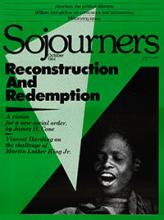By now it is no secret that a whole new wave of political activism is sweeping through the black communities of the United States. The black political renaissance is largely the result of the Reagan-era onslaughts that have hit black America especially hard. So far the most visible manifestations of this new era for black politics have been electoral: the election of black mayors in Chicago and Philadelphia, the unprecedented black voter turnout in the 1982 congressional elections, and most recently the Jesse Jackson presidential campaign.
Outside the view of the mainstream media, however, black activists and intellectuals are doing some hard thinking and having intense discussion about the direction this new political ferment will take after November. They are discussing what strategy is appropriate for the black freedom struggle in the 1980s and what new social vision the black movement can offer for the United States as a whole.
This month's two lead articles, by James Cone and Vincent Harding, are part of that ongoing discussion. They both first came to our attention as addresses presented at a conference on "'The Black Church, the Third World, and Peace" held last fall (see "People of Color, People of Peace," Sojourners, January 1984). Cone and Harding both present sketches of the black American future that are deeply rooted in the African-American religious heritage but fill out to envision the fundamental reshaping of U.S. society.
In planning this issue, our staff discussed whether this magazine, with a majority-white readership, was an appropriate forum for these articles, since they were addressed first to the black churches. We decided Sojourners' readers are a proper audience for Cone's and Harding's messages for a number of very convincing reasons.
Read the Full Article

